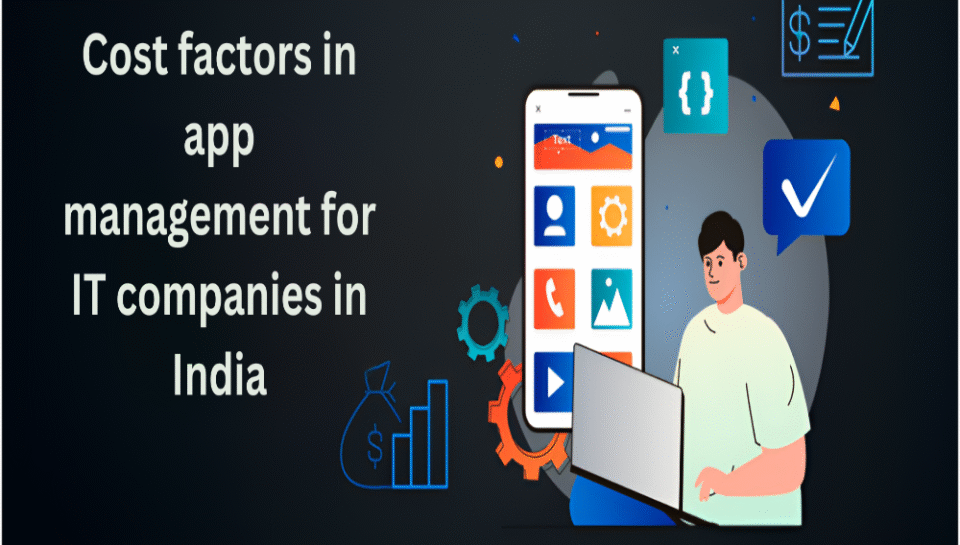
Briefly highlight the cost factors in app management for IT companies in India.
Introduction
App management is an essential function in IT companies across India, responsible for ensuring that mobile and web applications operate efficiently, securely, and reliably throughout their lifecycle. From startups to multinational service providers, Indian IT firms manage thousands of applications for both domestic and international clients. While app management drives innovation and customer satisfaction, it also introduces a complex set of cost factors that must be carefully evaluated and optimized. These costs span infrastructure, human resources, software tools, security, testing, updates, and compliance. For Indian IT companies operating in a competitive and budget-conscious market, understanding these cost components is vital for maintaining profitability and delivering consistent value. Effective app management strategies depend not only on technology but also on wise financial planning and resource allocation.
Development and initial deployment costs
The first major cost factor in app management is the development and initial deployment phase. This includes the expense of hiring skilled developers, designers, and project managers to plan and build the application. The cost also encompasses tools and platforms used for coding, prototyping, and version control. In India, while labor costs are relatively lower than in Western markets, experienced developers and UI/UX specialists still command competitive salaries. Moreover, deployment involves server setup, licensing fees for frameworks, and cloud infrastructure provisioning, all of which contribute to the upfront cost.
Maintenance and bug fixing expenses
Post-launch maintenance is an ongoing cost that includes regular bug fixes, performance monitoring, and system updates. IT companies in India must allocate dedicated teams or outsource these services to ensure continuous functionality. This process involves both scheduled updates and reactive issue resolution, which can become costly if not properly automated or streamlined. Maintenance costs vary depending on the complexity of the app, user base size, and technology stack. Failing to address these costs can result in downtime, user dissatisfaction, and eventual revenue loss.
Infrastructure and hosting charges
App management requires stable and scalable infrastructure, whether on-premises or cloud-based. For Indian IT companies, hosting charges from platforms like AWS, Azure, or Google Cloud form a significant part of the operational budget. These costs include server usage, data transfer, load balancing, storage, and backup services. Usage-based pricing models can lead to unexpected expenses if applications experience sudden surges in traffic. Choosing the right infrastructure, optimizing configurations, and forecasting resource needs help manage these charges effectively.
Security and compliance expenditures
Ensuring application security and compliance with Indian regulations like the IT Act, CERT-In guidelines, and the Digital Personal Data Protection Act adds another layer of cost. IT companies need to invest in secure coding practices, regular audits, encryption, penetration testing, and cybersecurity tools. Non-compliance may result in penalties or loss of client trust. The cost of hiring cybersecurity specialists or subscribing to managed security services is a necessary investment for protecting both user data and business credibility.
Testing and quality assurance costs
Comprehensive testing is a cornerstone of effective app management and adds to the financial outlay. Functional testing, load testing, regression testing, and UI testing all require time, tools, and specialized personnel. Automation tools like Selenium, Appium, and BrowserStack reduce manual labor but come with licensing fees. In India’s diverse digital landscape, testing apps across multiple devices, platforms, and network conditions further increases costs. However, quality assurance ensures stability and reduces the likelihood of post-launch failures.
License and subscription fees
Modern app management relies on a suite of software tools and third-party services that incur recurring costs. These may include version control platforms, analytics tools, monitoring software, collaboration tools, and cloud services. Indian IT companies using enterprise-level tools often face high subscription costs. Negotiating enterprise packages, selecting open-source alternatives, or building in-house solutions are strategies to reduce long-term costs while maintaining operational effectiveness.
Human resource and training investments
Managing apps requires skilled developers, testers, DevOps engineers, security analysts, and support personnel. Recruiting, retaining, and upskilling these professionals form a significant part of the app management budget. With emerging technologies like AI, cloud-native development, and cybersecurity evolving rapidly, continuous training programs are necessary to keep teams up to date. Training sessions, certifications, and knowledge-sharing events contribute to operational excellence but also add to HR costs.
Third-party integration and API management costs
Many enterprise applications rely on third-party APIs for functionalities like payment processing, geolocation, social media integration, or data feeds. These APIs often come with usage charges or premium service tiers. Indian IT companies must also factor in the cost of managing and maintaining these integrations—handling API versioning, latency issues, and failovers. As dependency on third-party services increases, so does the complexity and cost of monitoring and managing them.
Customer support and service management
Providing continuous user support, especially for customer-facing apps, is another cost component of app management. This includes live chat systems, ticketing platforms, call center integrations, and support teams. In India, where many apps operate in regional languages, multilingual support becomes an additional cost. App managers must also invest in CRM tools, automated support bots, and feedback systems to ensure high levels of user satisfaction and retention.
Scaling and performance optimization expenses
As user bases grow, apps need to scale without compromising performance. This involves investing in scalable architecture, load testing tools, and performance monitoring systems. Cloud auto-scaling, container orchestration, and serverless technologies also bring associated costs. In the Indian IT context, where client contracts may depend on performance SLAs, failure to optimize app performance can result in revenue loss or contract penalties, making these investments crucial for long-term profitability.
Conclusion
App management is a multi-faceted function that blends technology, strategy, and cost management. For IT companies in India, where margins are often tight and competition is fierce, understanding and controlling the various cost factors in app management is key to operational success. From infrastructure and compliance to talent and support systems, every stage of the app lifecycle brings its own financial considerations. Proactive planning, intelligent automation, and strategic investments can help optimize these costs while ensuring high performance, security, and user satisfaction. As the Indian digital economy continues to grow, cost-efficient app management will remain a defining factor in the sustainability and scalability of IT firms across the country.
Hashtags
#AppManagement #CostOptimization #IndianIT #AppBudgeting #TechOperations #MaintenanceCost #InfrastructureCost #CloudHosting #CyberSecurityInvestment #ComplianceCost #TrainingCosts #DevOpsIndia #SoftwareTesting #HRinTech #AppScalability #SupportCosts #DigitalIndia #AppDevelopmentIndia #ITCostManagement #SoftwareOperations #PerformanceTuning #DataComplianceIndia #ThirdPartyAPIs #MonitoringTools #ITFinance





